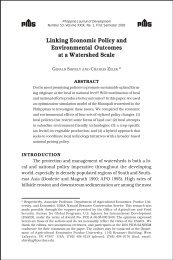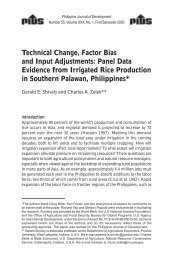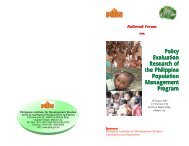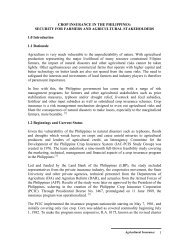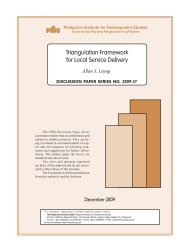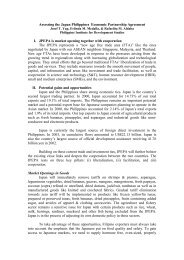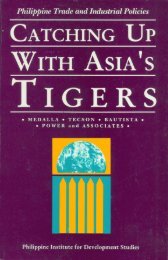Read More - Philippine Institute for Development Studies
Read More - Philippine Institute for Development Studies
Read More - Philippine Institute for Development Studies
Create successful ePaper yourself
Turn your PDF publications into a flip-book with our unique Google optimized e-Paper software.
3<br />
Administration (PAGASA), the <strong>Philippine</strong> <strong>Institute</strong> <strong>for</strong><br />
<strong>Development</strong> <strong>Studies</strong> (PIDS) and the Leyte State<br />
University (LSU) while <strong>for</strong> Australia, the key institutions<br />
involved are South Australian Research and <strong>Development</strong><br />
<strong>Institute</strong> (SARDI), New South Wales Department of Primary<br />
Industries (NSW-DPI), and University of Sydney.<br />
The SCF project between Australian and <strong>Philippine</strong><br />
institutions will draw on economics and other disciplines<br />
to develop robust ways to use SCFs in risk management.<br />
This project will work with decisionmakers in the<br />
<strong>Philippine</strong>s and Australia to see where, when, and why<br />
skillful but uncertain SCFs can be valuable, and the<br />
circumstances when they are best ignored. The end result<br />
will be increased incomes of rural communities in the<br />
<strong>Philippine</strong>s and Australia.<br />
The project is expected to bring about improved<br />
economic, social, and environmental outcomes in the<br />
collaborating countries given that better management of<br />
climate variability has the potential to improve resource<br />
use efficiency by providing economic benefits through<br />
improved crop planting, management and grazing<br />
strategies.<br />
Case studies in the <strong>Philippine</strong>s and Australia will be<br />
used to assess where economic, environmental and social<br />
benefits may arise. The <strong>Philippine</strong> studies will focus on<br />
poor Filipino farmers who are vulnerable to climate<br />
variability while Australian studies will consider the impact<br />
of droughts on farming families and rural communities.<br />
Two key methods are to be employed in this project.<br />
The first is to value the potential contribution of SCF to<br />
decisionmaking under climate uncertainty based on<br />
insights from economics and psychology. The second<br />
method is the use of farm and policy-level case studies in<br />
the <strong>Philippine</strong>s and Australia to gain a practical appreciation<br />
of how decisionmakers actually use SCF and how to<br />
bridge the gap between potential and actual use of SCF.<br />
Case studies will use representative farm models to<br />
estimate the potential value of SCFs and will provide<br />
in<strong>for</strong>mation on how farmers and other decisionmakers<br />
use SCFs to make real decisions. An important component<br />
of the project is the development of extension strategies<br />
based on the case study experiences to promote the value<br />
of SCFs. To help implement this, the project will tap into<br />
extension networks in Australia and the <strong>Philippine</strong>s and<br />
provide tools <strong>for</strong> agricultural advisers to confidently<br />
promote SCFs to decision problems with the greatest<br />
payoff.<br />
Objectives<br />
• To improve the capacity of PAGASA to develop and<br />
deliver SCF <strong>for</strong> the case study regions of the<br />
<strong>Philippine</strong>s;<br />
• To distill key practical and methodological features of<br />
economic and psychological approaches to valuing SCF;<br />
• To estimate the potential economic value of SCF <strong>for</strong><br />
farm and policy or industry level case studies in the<br />
<strong>Philippine</strong>s and Australia;<br />
• To identify those factors leading to a gap between<br />
actual and potential values of SCF; and<br />
• To develop and implement strategies to better match<br />
<strong>for</strong>ecasts with decisionmaker’s needs. (SCF Project<br />
Updates June 2005)<br />
People and organizations involved...<br />
<strong>Philippine</strong> Atmospheric, Geophysical and<br />
Astronomical Services Administration (PAGASA)<br />
PAGASA is the <strong>Philippine</strong>s’ meteorological service<br />
organization and is a member of the World Meteorological<br />
Organization. Its mandate is “to mitigate or reduce the<br />
losses to life, property and the economy of the nation<br />
occasioned by typhoons, floods, droughts and other<br />
destructive weather disturbances.” Its website is http://<br />
www.pagasa. dost.gov.ph/.<br />
Dr. Flaviana D. Hilario is the chief of the Climatology<br />
and Agrometeorology Branch (CAB). She will supervise<br />
the preparation of the SCF and will coordinate with<br />
concerned agencies like the PIDS and LSU in the smooth<br />
implementation of the project.<br />
Ms. Edna L. Juanillo is the head of the Climate<br />
In<strong>for</strong>mation Monitoring and Prediction Center (CLIMPC)<br />
of the PAGASA (Weather Bureau). She is involved in the<br />
interpretation and analysis of the different climate<br />
parameters needed in the preparation of SCF. She will<br />
assist in the coordination of the <strong>Philippine</strong> activities with<br />
PIDS and LSU in the conduct of the study in the first two<br />
years of the project.<br />
Ms. Rosalina de Guzman is the assistant head of<br />
CLIMPC. She is involved in the preparation and issuance



